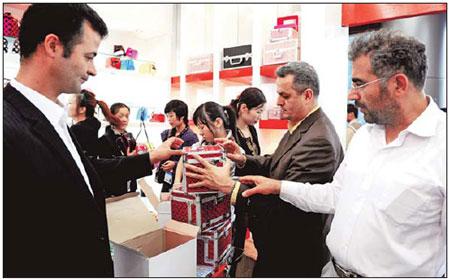
Foreign buyers examine items at a small-goods market in Yiwu, Zhejiang province. China City Complex, a commercial and wholesale town similar to China's Yiwu, is to be built in Thailand. Zhang Jiancheng / for China Daily
China City Complex will be built in Bangkok with 10 billion yuan
China plans to construct a second Yiwu International Trade City, the world's biggest small-commodities hub, in Thailand.
It's part of a move to make the southeastern neighbor a re-export center to promote the country's small-goods exports in a global market troubled by rising trade protectionism.
With investment of 10 billion yuan ($1.51 billion), construction will begin in Bangkok on Jan 18 at the China City Complex, a commercial and wholesale town similar to China's Yiwu.
It will sell Chinese-made goods, including garments, ornaments and household items.
"China City Complex is one of the biggest cooperation projects between China and Thailand, corroborating a strategic business-partner relationship between the two countries," said Alongkorn Ponlaboot, Thailand's deputy-minister of commerce, on Wednesday, who had traveled to Yiwu to woo investors.
Construction of the commercial city, which will cover 700,000 square meters, is expected to be completed by 2013. It will attract more than 70,000 commercial tenants from China, according to Dong Hongqi, chairman of Yunnan-based Ashima Cultural Industry (Group) Investment Co Ltd, the Chinese partner in the project.
"Apart from the business opportunities in Thailand, Chinese exporters can also promote their products to developed markets such as the European Union and the United States through this project," Yang Fangshu, chairman of the ASEAN-China Economic and Trade Promotion Association, said, adding that Chinese investors enjoy bilateral trade with Thailand without the imposition of tariffs, and also low tariffs when trading with other developed economies.
Yang said the trade quota between Thailand and developed economies, including the EU and US, is also much more than that of China, so Chinese-made goods could be re-exported from Thailand without such strict limitations as those in China.
Fueled by the new Free Trade Agreement (FTA) signed between China and the 10-member Association of Southeast Asian Nations (ASEAN) last year, the trade volume within the free-trade zone reached $161 billion, registering a year-on-year increase of 50 percent, in the first seven months of 2010.
The trade volume between China and ASEAN countries is set to reach $500 billion by 2015.
Since the FTA was established in January 2010, most goods traded between China and ASEAN countries have been subject to zero or very low tariffs, thus allowing a freer flow of capital, resources, technology and talents.
However, China has been a major target of trade protectionism when trading with developed countries. In 2009, there were 127 cases filed by trade partners against China, the largest number ever.
The United States International Trade Commission decided in November to maintain anti-dumping duties ranging from 43 percent to 216 percent on wooden Chinese-made bedroom furniture for another five years.
"Thailand's low tariff with developed economies is a big attraction for me, as our exports have been severely influenced by the high tariffs imposed by the EU and US this year," Huang Ruineng, manager of Tiantian Jewelry Sales Department in Yiwu.
According to Huang, more than 80 percent of his store's foreign demand comes from the EU and US.
China Daily





